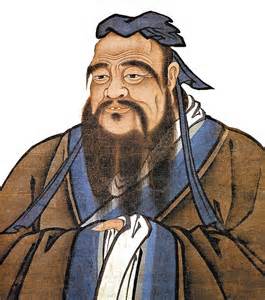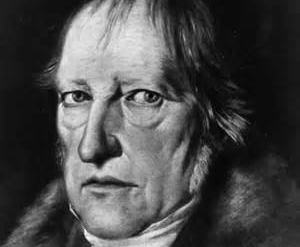Consummation a common philosophical thread in Hegelian, Confucian thought

Confucius (551-479 BC) was an educator, politician, and philosopher of the Spring and Autumn period (770-476BC). Aphorisms concerning his teachings were compiled in the Analects by his disciples posthumously. During the reign of Emperor Wu of Han (141-87 BC), his thoughts received official sanction and were further developed into a system known as Confucianism.

Georg Wilhelm Friedrich Hegel (1770-1831) was a German philosopher. Among all his works, Phenomenology of Spirit, Lectures on Aesthetics, and Lectures on the Philosophy of History are most renowned ones. His historicist and idealist account of reality revolutionized European philosophy and inspired Continental philosophy, Marxism, and historism.
Much to the delight of contemporary philosophers, comparative philosophy has become a new frontier of intellectual exploration owing to the fact that the founding principles of the discipline conform to the reciprocal nature of culture and ideas. Yet most comparative studies of Chinese and Western thought tend to be narrow in scope and solely preoccupied with parallels between traditional Chinese ideas and those of the modern West.
Indeed, it is reasonable to relate the kernel of Chinese thought to Martin Heidegger's (1889-1976) existentialism, hermeneutics, and theories of embodiment and perception championed by French philosophers because the connection is unequivocal in all senses. By contrast, pre-modern Western philosophy seems to lend itself less to cross-comparison due to its excessive emphasis on epistemology and logic.
Yet He Lin's (1902-92) study on Georg Hegel's (1770-1831) thought and Zhu Xi's (1130-1200) doctrine of the "Supreme Ultimate" predates domestic research on comparative philosophy. Later on, Mou Zongsan (1909-95) related Immanuel Kant's (1724-1804) moral history to the Confucian concept of mind and nature. Both Hegel and Kant are paragons of pre-modern Western philosophy.
In this light, it seems that scholars failed to break free of the epistemological and logical semblance of Western philosophy and thus were estranged from its essence. In this article, I intend to identify the common ground of and boundary between Hegel’s thought and Confucian ideas. The topic will be discussed in two logically related steps. First, I will point out the nature and ideal of Hegelian and Confucian theories. Second, I will explain the approach to such nature and ideal.
Hegelian consummate philosophy
Hegelian philosophy mainly dealt with the question of God. Unlike Christian religionists who merely scratched the surface of divinity, he intended to establish the existence and supremacy of God in a scientific manner. However, after Kant's critique of epistemology was widely accepted, it became fallacious to posit human beings as the starting point to the understanding of God. The only viable path was to posit God, his revelation and incarnation, as the departure point toward reality.
Among all creatures, only human beings are capable of comprehension and reflective thinking. By pondering over history and reality, we can discover the infinite divinity inherent in the finite world.
There are two steps in the process: the descent and embodiment of God and mankind’s return to God via various practices. To a certain extent, the process is comparable to the Christian theories of original sin and redemption. However, Hegel insisted on an immanent unity between the finite world and the infinite God, while such a unity is absent in Christian thought. To Christian philosophers, God and the human world are detached from each other.
If God is removed from the equation, what is the highest spirituality of human being? If inner clarity springs from conscious reflection on the spiritual side of the inner self, it means that human beings are programmed to seek consummation as their ultimate goal. For Hegel, the relation between freedom and necessity is of fundamental importance. From such a vintage point, God is necessarily the unity between freedom and necessity, and the ascent of human beings is about unifying freedom and necessity via conscious effort to achieve self-growth. Arduous and lengthy, the process of self-growth enables one to become fully refined and enlightened.
There is a tendency narrowly equating freedom with unruliness and intractability, evading necessary restrictions exerted by law, regulation and other parties. Such restrictions are obligatory in its civilizing and cultivating functions. Individuals break away from the willful old self as they become mindful of law and other people’s interests. Free beings are conscious of the fact that their behaviors are subjected to various restrictions. Such awareness marked a thorough departure from willfulness and unruliness.
It would be reassuring if most people are mindful with the boundary and responsibility associated with their freedom in everyday life, although such mindfulness is no more than a deferential gesture to commonsense rationality. However, Hegel's contemplation did not end here. How did he push forward the thesis concerning freedom and restriction?
He identified our intrinsic nature and subjective freedom with extraneous constraints such as law, regulation and other people's stance, considering them as an integrated whole. To Hegel, the externalization of subjective freedom should always be harmonious with inevitable constraints. In an intuitive sense, the Hegelian harmony points to the consummate state of existence and the highest purpose of individuals who embrace inclusiveness. Illuminating and high-aspiring, such ideas are analogous to Confucius's (551-479 BC) saying of following "what my heart desired without transgressing against what is right."
Immanent transcendence
Confucian thought emphasized immanent transcendence. In fact, traditional Chinese culture as a whole has always been concerned with transforming the secular into the benevolent and saintly. When asked to comment on his pursuit of benevolence and true learning, Confucius said: "At 15, I had my mind bent on learning. At 30, I stood firm. At 40, I had no doubts. At 50, I knew the decrees of Heaven. At 60, my ear was an obedient organ for the reception of truth. At 70, I could follow what my heart desired without transgressing against what is right."
To a certain extent, being a saint is to remain faithful to one's true heart while adhering to the criteria of propriety. Hegel's idea on the association between freedom and necessity can be considered a Western-style interpretation of Confucian sainthood. The path to the consummating realm of sainthood is worth pondering.
There are three logical hierarchies in Confucian thought: Dao as substance (daoti), nature as substance (xingti) and the heart-mind as substance (xinti). The three hierarchies are not mutually exclusive. Instead, they are distinct manifestations of the same substance in different realms, akin to the Christian theory of the Trinity. The Confucian doctrines of the mind are remarkably cohesive, integral and organic.
The unity of Heaven and heart-mind is indisputable from the perspective of Confucianism. From such a vintage point, human nature and heart-mind can only amount to consummation given that the way of Heaven is the ontological base, imperator and constituent of humans and other entities. That is why the inner world of human beings is endowed with immense power. In this vein, one is inherently capable of subordinating external entities and fellow human beings.
To Confucian scholars, this is the inherent characteristic of human beings, expressed through the "original heart-mind," human beings are fundamentally different from objects because we can externalize our intrinsically perfect nature through reaching to and reflecting on our original heart-mind. This idea is developed from Mencius's (372-289 BC) saying of "exploring the heart-mind and knowing nature" and Wang Yangming's (1472-1529) notion of "attaining intuitive knowledge." In Confucian doctrines, immanence is synonymous with consummation with respect to human nature. Our impeccable self will loom large and attain oneness provided that we consummate our efforts to explore our heart-mind.
Common ground and boundary
Evidently, Hegelian philosophy and Confucian thought coincide in the definition of consummation. Oblivious of the essential nature of the concept, some scholars still contend that the two schools of thought are completely different from each other. Undeniably, the two philosophical systems are distinct in their manifestations given that Hegel resorted to logical proof and argumentation, while Confucian thinkers embarked on the path of restoring the perfect self endowed by Heaven yet contaminated by myriad desires.
Such discrepancy is a telling example of the cultural differences between China and the West, and this induced Hegel to disregard the achievements of Chinese philosophy. Undoubtedly, Hegelian philosophy is exceptional among various schools of Western thought and deserving of contemplation and examination through a comparative lens. However, its rigidly rationalistic tendency should be reconciled with a healthy dose of spirituality. Penetrating its hard-nosed rationalistic veneer, we can deem that the essence of Hegel’s thought shared the same insights with Confucian traditions.
Ding Ning is a lecturer at the Falculty of Philosophy and Social Sciences of Jilin University.

 PRINT
PRINT CLOSE
CLOSE